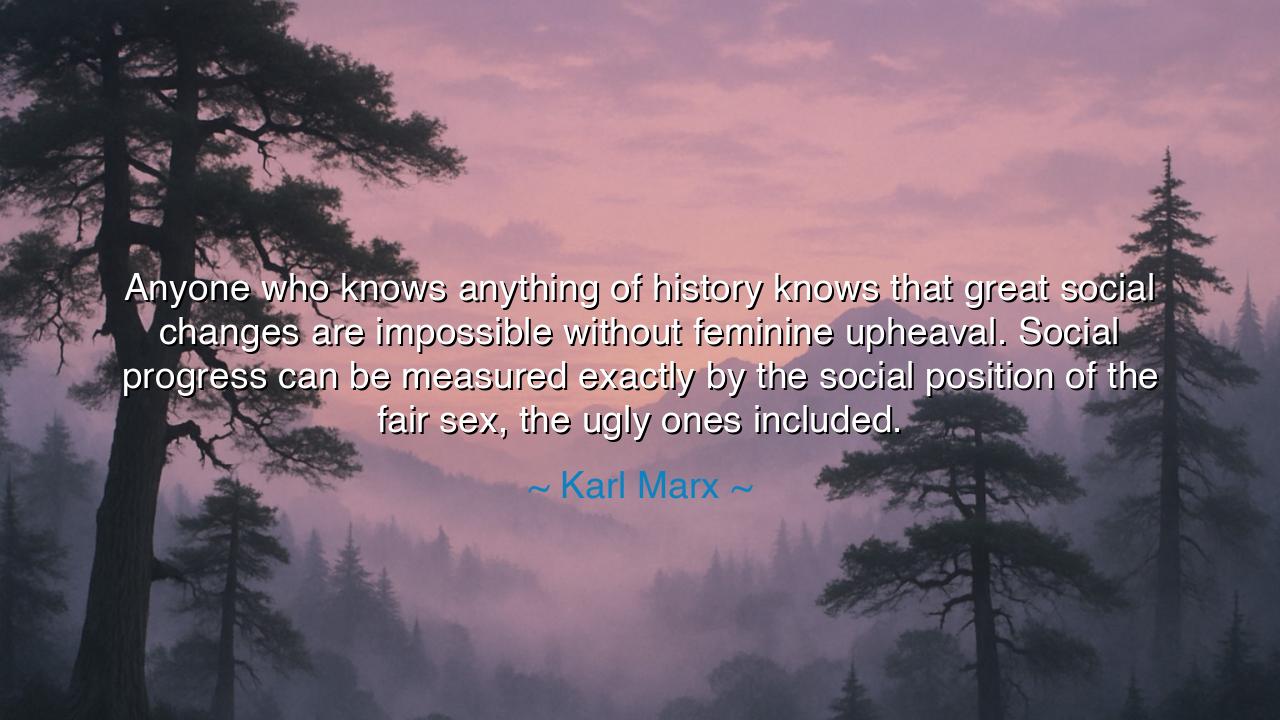
Anyone who knows anything of history knows that great social
Anyone who knows anything of history knows that great social changes are impossible without feminine upheaval. Social progress can be measured exactly by the social position of the fair sex, the ugly ones included.






Listen, O seekers of wisdom, and mark well the words of Karl Marx, a thinker whose gaze pierced not only the machinery of industry but the hidden currents of society itself: “Anyone who knows anything of history knows that great social changes are impossible without feminine upheaval. Social progress can be measured exactly by the social position of the fair sex, the ugly ones included.” At first, these words may appear simple, yet they resound like the clarion of a thousand ages, declaring that the destiny of humanity is intertwined with the liberation and dignity of women. The ancients would have recognized this truth, for the fates of nations have always been written upon the lives of their daughters, mothers, and sisters.
Marx’s observation begins with history as witness. In every epoch, the rise of cities, the formation of laws, and the tides of revolutions have been accompanied by the stirring of women from their prescribed roles. Consider the city-states of Athens: when women dared to influence the household, the very foundation of civic life quivered. Or recall the tumult of the French Revolution, when figures like Olympe de Gouges demanded equality, penning the Declaration of the Rights of Woman and the Female Citizen, her voice a testament that social upheaval cannot bloom without feminine courage and defiance. The upheaval of women is not mere accessory to change—it is the pulse, the heartbeat that quickens the march of progress.
The quote illuminates the inseparability of social progress and gender equality. Marx’s words remind us that no society can claim greatness if it suppresses half its people. True justice, he implies, must recognize the value of all women, the fair and the ugly, the celebrated and the overlooked. In the annals of history, we see this mirrored in countless struggles: the suffragette movements of Britain and America, where women endured imprisonment, ridicule, and violence to claim a voice in the public sphere. These efforts were not mere personal victories—they were seismic tremors that reshaped the moral and political landscape of nations.
Yet, Marx’s insight is as much about morality as it is about politics. He compels us to understand that the measure of a society is reflected in the treatment of its most vulnerable and marginalized women. A society may boast palaces and armies, yet if it fails to honor the dignity of all women, its progress is but an illusion. In the 20th century, the rise of female labor movements, from the textile factories of Lowell to the industrial centers of Europe, demonstrated that when women claim their space, they reshape economies, laws, and collective consciousness. The upheaval of women is the forge upon which social reform is hammered into reality.
Marx also challenges us to consider the breadth of humanity in social change. By invoking “the ugly ones included,” he emphasizes that progress is not only for the elite or the attractive but for all, especially those historically overlooked. History often glorifies the celebrated, yet it is the countless unnamed women—mothers, laborers, rebels—whose persistence crafts the foundation of enduring transformation. Recall the story of Rosa Parks, who did not seek fame, yet her refusal to yield her seat became a pivotal moment in civil rights and social progress. Her defiance exemplifies that the contributions of every woman, seen or unseen, propel society forward.
From this, we derive a powerful lesson: social progress is inseparable from the liberation of women. To build a just society, one must nurture, protect, and empower the voices that have long been silenced. A nation’s greatness is measured not by its armies or monuments but by the respect and agency it affords to all women. The upheaval of the feminine is both a mirror and a motor—reflecting injustice and driving change.
Therefore, let this wisdom guide your actions: elevate women, honor their struggles, and amplify their voices in every sphere of life. Resist the temptation to see equality as optional, for it is the very foundation upon which the arc of justice bends. Engage actively in dismantling structures that suppress, and cultivate spaces where all women can flourish, from the fair to the overlooked.
In the end, the ancients would remind us, and Marx confirms, that the soul of a society is revealed in its treatment of women. Seek not only to witness history but to shape it, ensuring that the upheaval of women is met with embrace, not resistance. Let this be your enduring pursuit: a world where progress and justice march hand in hand with the liberation of every woman, for in this lies the truest measure of civilization.






AAdministratorAdministrator
Welcome, honored guests. Please leave a comment, we will respond soon